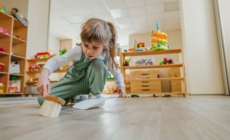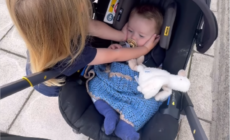-
Kevin Durant-LeBron James Career News Turns Heads - 7 mins ago
-
NFL Week 7 Picks: 3 Best ATS Bets - 41 mins ago
-
Hit-and-Run at a Child’s Birthday Party Injures 14 - 44 mins ago
-
Dodgers Reportedly To Pursue 4-Time All-Star - about 1 hour ago
-
Shutdown Fight Reopens Debate in G.O.P. Over Health Care - about 1 hour ago
-
Underdog Promo Code NEWSWEEK: Claim $100 Bonus For NFL Week 7 Sunday - 2 hours ago
-
Gaza Cease-Fire Strained by New Flare-Up of Violence - 2 hours ago
-
Multiple NY Giants Rookies Land on Key Top 10 List - 2 hours ago
-
An Ode to October Baseball - 3 hours ago
-
Child Psychologist Reveals Parenting Habits That Create Struggling Adults - 3 hours ago
Child Psychologist Reveals Parenting Habits That Create Struggling Adults
Do you ever find yourself jumping in to finish cleaning up your child’s toys even when you asked them to do it? Or perhaps instead it has become a reflex to stop tears to prevent that meltdown in Target.
While many modern parents are working to give their children the best start by constantly solving problems, filling schedules or cushioning disappointments, child psychologists are saying that well-meaning effort may be leaving kids unprepared for real life.
“Parents… are working overtime to make their children’s lives smooth, safe and happy,” psychologist professor Daniel J. Moran, of Touro University, New York, told Newsweek.
He continued: “The intention is love, [but] the outcome is often dependency.”

When parents remove discomfort quickly, children never get to develop coping skills, which can become problematic later in life, he added.
From a behavioral science perspective, children learn confidence by experiencing consequences and discovering they can handle them.
Moran, who specializes in Acceptance and Commitment Therapy (ACT), said that true resilience comes from “learning to stay present, feel the hard stuff and keep moving toward what matters.”
He identified three common habits that quietly stunt independence:
- Fixing instead of coaching: Jumping in to solve every problem teaches kids they that can’t work things out on their own.
- Overpraising: Telling a child that they rere “amazing” no matter what removes the learning value of effort and feedback.
- Overscheduling: Endless adult-organized activities leave little room for boredom which, Moran, said is a place “where creativity and self-direction grow.”
Instead, he advised parents to let them “struggle safely.” Modeling acceptance of mistakes and asking reflective questions such as “Who do you want to be right now?” can help children develop internal motivation and self-guidance.
“If we want confident, capable young adults, we have to let kids practice being uncomfortable,” Moran said. “Confidence doesn’t come from constant praise, but comes from persistence, problem-solving and purpose. A little discomfort today can build the psychological flexibility they’ll need tomorrow.”
Dr. Samantha Whiten, clinical psychologist and owner of Best Life Behavioral Health, agreed. She said one of the biggest mistakes she sees is parents doing everything for their children out of love—or out of a desire to “heal” their own unhappy childhoods.
“When your own upbringing was not that happy, it can be very tempting to… [make] sure that your child is given all the attention and care that you were never given,” Whiten said. “However, if you swing… to the extreme of bubble wrapping your child, this is not much better than what you may have experienced.”
According to Whiten, overhelping encourages overdependence. “Doing everything for your child when they can physically do things for themselves… trains them to depend on you for everything versus being proud and confident in what they can master on their own,” she said.
Instead, Whiten recommended a gradual approach to building independence: demonstrate the task first, let the child try it while you observe without interference, then step away to show trust.
“When you leave the room, you show that you are confident in your child and promote a feeling of happiness and pride,” she said.
Do you have a tip on a health story that Newsweek should be covering? Do you have a question about child psychology? Let us know via health@newsweek.com.
Source link

















